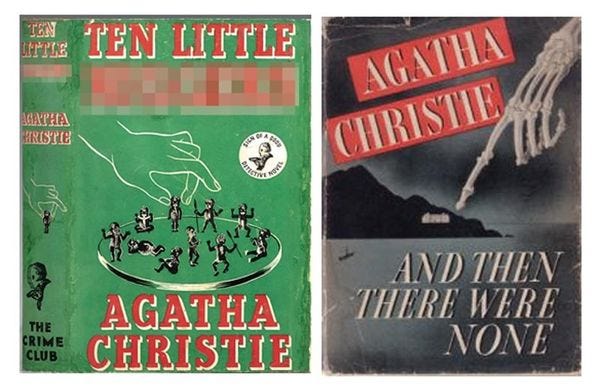Without Charming Old-Time Racism, Agatha Christie Novels Now Just Wokedunnits
Oh no, there goes Western Literature again.
Several Agatha Christie novels are being reissued in new editions that have removed the original texts' racist language, in hopes that they'll remain marketable for modern audiences. The changes have been made by publisher HarperCollins to novels originally published between 1920 and 1976, featuring Christie's two most popular detectives, Miss Marple and Hercule Poirot. The entire run of Marple novels have been updated, as have selected Poirot books.
It appears that some of the new editions actually went into print in 2020 without anyone noticing, according to the Telegraph, while others have yet to be released. As of yet, only a few American wingnuts have gone ballistic over this unspeakable defacement of a beloved writer they haven't thought about in years, although we have little doubt that Ben Shapiro is salivating at the prospect of saying on video the original 1939 title of the mystery that was released in the US in 1940 as And Then There Were None.
As the Telegraph delicately puts it, the new editions have been edited to remove "passages containing descriptions, insults or references to ethnicity, particularly for characters Christie’s protagonists encounter outside the UK." The n-word is removed, as is "Oriental," since that's no longer the preferred nomenclature, Dude. (We'll assume the train is still the "Orient Express," because that title is gold, Jerry, GOLD.) Unflattering mentions of characters being Jews are gone, and references to "natives" are changed to "locals."
The Telegraph notes that some of the edited passages are in the "interior monologues" of Marple or Poirot — egad, they're literally victims of thought police! — while other snips involve the dialogue of already unsympathetic characters.
For instance, in Death on the Nile, a 1937 Poirot outing, Mrs. Allerton speaks contemptuously of children bothering her, saying, "they come back and stare, and stare, and their eyes are simply disgusting, and so are their noses, and I don’t believe I really like children.”
That's been changed to "They come back and stare, and stare. And I don’t believe I really like children," which we figure is enough to make her unsympathetic as it is. In the same novel, the term "Nubian" has been excised as well, so "the Nubian boatman" becomes "the boatman," and what a loss to literature that is.
Also too, the Telegraph notes,
Dialogue in Christie’s 1920 debut novel The Mysterious Affair at Styles has been altered, so where Poirot once noted that another character is “a Jew, of course”, he now makes no such comment.
In the same book, a young woman described as being “of gypsy type” is now simply “a young woman”, and other references to gypsies have been removed from the text.
Well gosh, without the rank ethnic stereotyping, how are readers supposed to even know those characters are untrustworthy?
We haven't yet seen quite as much rightwing outrage about the edits to Christie as we noticed when more extensive changes were made to Roald Dahl's children's books, possibly because Christie is more readily considered a consumer product, or maybe simply because the edits seem less ridiculous. A separate Telegraph column decrying the "woke censorship" of Christie argues that with all the racist and antisemitic stuff removed, readers can't appreciate that these are novels written in the past, when terrible attitudes were less civilized (or at least less carefully concealed), and we should understand that.
Note how casually the characters make such remarks. Note also how no other character objects. This teaches the 21st-century reader something important about the period in which these books were written. In the 1920 and 30s, middle-class, educated, well-mannered English people could, and would, give voice to nakedly antisemitic prejudice in everyday conversation – without fear of rebuke or disagreement. It was perfectly unremarkable, at the time. Antisemitism, after all, was not invented by the Nazis. It is an ancient and widespread prejudice. Reading an early Agatha Christie highlights this – and if it shocks the 21st-century reader, then good. It should.
But does anyone really read Christie for the sake of seeing how casually racist Britons were in the 1920s? We suspect probably not: the appeal of Christie has always been the clever detecting and the big reveal of the killer, and HarperCollins, as mercenary as any industrialist, wants to sell the whodunnits with as few grumpy product returns as possible.
Also, with millions of copies of Christie's books already out there, we should point out that no one will be required to turn in their old copies when they buy a new edition of the book. You want all the stereotypes, you'll have no trouble finding a copy.
[ Guardian / Telegraph (paywalled)]
Yr Wonkette is funded entirely by reader donations. If you can, please give $5 or $10 monthly so we can keep woking your socks off.
Do your Amazon shopping through this link, because reasons .




It's not about the law. It's about the work itself. She wrote a book. Published as she wanted. And decades later someone else rewrote it. It's not her book anymore. Is all I'm saying.
I went to a delightful showing of Murder on the Orient Express last year, with the role of Hercule Poirot being played by a local Black actor who absolutely nailed the part.
Generally, I see nothing wrong with tweaking language to match modern speech, as long as it's disclosed. Heaven help us if we had to read Shakespeare with the original spelling, for example!